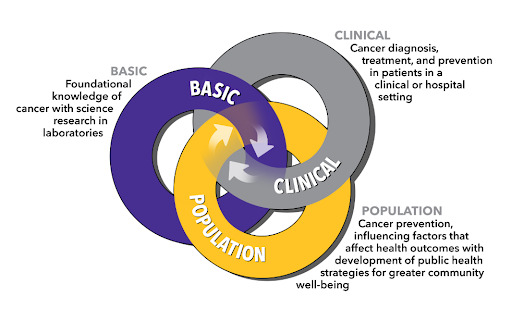Translational Oncology and Clinical Care

Program Lead:
Qiang Shen (qshen@lsuhsc.edu)
Program Co Lead:
Krzysztof Reiss (kreiss@lsuhsc.edu)
LSU LCMC Health Cancer Center translational oncology and clinical care research serves as a critical link between laboratory research and patient care. Using a bench-to-bedside approach, our research facilitates the translation of scientific discoveries, innovative technologies, and treatments into practical applications that can benefit patients in Louisiana and around the globe.
LSU LCMC Health Cancer Center translational oncology and clinical care research aims to bridge the gap between scientific discoveries and their application in clinical practice.
By accelerating the process of turning scientific knowledge into tangible benefits, our program plays a vital role in improving healthcare outcomes and enhancing the quality of care provided in our cancer center.
Translational Oncology and Clinical Care Research in Practice
Bench-to-Bedside Translation
Bench-to-bedside means translating laboratory findings into clinical applications. It aims to identify promising therapeutic targets, develop innovative interventions, and optimize treatment strategies that can be directly implemented in patient care settings.
Personalized Medicine
Our research advances personalized medicine by integrating cutting-edge technologies such as genomics, proteomics, and bioinformatics. By analyzing individual patient characteristics — including genetic profiles and biomarkers — our research aims to tailor treatment plans to maximize efficacy and minimize adverse effects.
Improving Diagnostic Tools
We are dedicated to developing and refining diagnostic tools that enable early detection, accurate diagnosis, and precise monitoring of disease progression. This allows for timely intervention and personalized treatment approaches.
A More Than Medicine Approach to Cancer Care
LSU LCMC Health Cancer Center translational oncology and clinical care research:
- Facilitates multidisciplinary collaboration: Translational medicine requires close collaboration between researchers, clinicians, and allied healthcare professionals, fostering a team-based approach to patient care that considers diverse perspectives and expertise.
- Promotes innovation and cutting-edge technologies: By using a bench-to-bedside approach, our research translates promising new treatments from the laboratory and clinical trials to patient care.
- Advances patient-centered care: By tailoring treatment plans based on individual patient characteristics, our research promotes personalized medicine, enhancing patient engagement, satisfaction, and overall well-being.
Successes of LSU LCMC Health Cancer Center Translational Oncology and Clinical Care Research
We are working toward new success and some expected outcomes including:
- Accelerated new cancer drug development: By streamlining the translation of promising compounds from the laboratory to clinical trials, our research has contributed to the expedited approval of novel drugs, bringing new treatment options to patients more rapidly.
- Improved patient outcomes: Through personalized medicine approaches and targeted therapies, our research has enhanced treatment efficacy and minimized adverse effects, leading to improved patient outcomes, prolonged survival, and better quality of life.
- Enhanced diagnostic capabilities: Our researchers’ focus on diagnostic innovation has resulted in the development of more accurate and sensitive tests, enabling earlier disease detection, precise diagnosis, and effective monitoring of treatment response.
Looking Ahead in Translational Oncology and Clinical Care
Translational oncology’s objective of making significant strides in bridging the gap between research and patient care has become an integral part of LSU LCMC Health Cancer Center's mission.
The future of our research centers on:
- Enhanced collaboration: The program will foster even stronger partnerships and collaborations among researchers, clinicians, industry experts, and patient advocates. This multidisciplinary approach will facilitate the seamless translation of scientific discoveries into practical applications and ensure that patient needs remain at the forefront of research efforts.
- Personalized medicine as standard care: Personalized medicine will be widely adopted as the standard of care. The program will make substantial progress in integrating genomics, proteomics, and other advanced technologies into routine clinical practice, enabling tailored treatment plans that account for individual patient characteristics, including genetic profiles, biomarkers, and lifestyle factors.
- Advanced therapeutic approaches: The program will further advance the development and implementation of novel therapeutic approaches. Gene therapies, immunotherapies, and targeted therapies will become more refined and accessible, offering patients highly effective and minimally toxic treatment options. Additionally, the program will explore emerging fields such as regenerative medicine and nanomedicine, opening new avenues for innovative interventions.
- Precision diagnostics: The program will revolutionize diagnostics, with significant progress in the development of non-invasive, highly sensitive, and specific diagnostic tools. Early detection and precise monitoring of disease progression will be routine, enabling timely intervention and improved patient outcomes. Integration of artificial intelligence and machine learning algorithms will aid in data analysis, diagnosis, and treatment decision-making.
